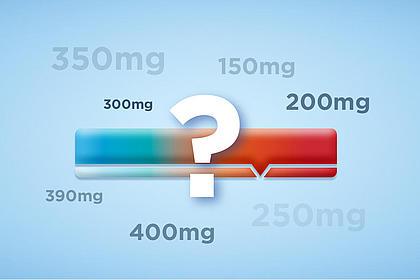Wadenkrämpfe: Ursachen, Behandlung und Tipps
Die Ursachen für Muskel- und Wadenkrämpfe sind vielfältig. Sie reichen von starker körperlicher Belastung über Fehlstellungen der Beine bis hin zu ernsthaften Grunderkrankungen. Besonders häufig liegt bei Muskel- und Wadenkrämpfen ein Magnesiummangel vor.

Ursachen
Wie entstehen Muskel- und Wadenkrämpfe?
Bei einem Krampf verkürzt sich ein Muskel unwillkürlich für kurze Zeit. Charakteristisch sind plötzlich einsetzende, stechende Schmerzen in der Wade, die von einer Verhärtung der Muskulatur begleitet werden. Meist treten Wadenkrämpfe in der Nacht auf, weil gerade nachts die Magnesium-Konzentration im Blut natürlicherweise absinkt.
Muskelkrämpfe, die uns nachts wecken, sind ein weitverbreitetes Phänomen – auch bereits in jungen Jahren. So berichten bereits junge Erwachsene mit einer Häufigkeit von über 90 % von gelegentlichen nächtlichen Wadenkrämpfen. Mit dem Alter nehmen diese jedoch zu. Bei den über 65-Jährigen leiden etwa 33 bis 50 % mehr als einmal pro Woche an Wadenkrämpfen.1
Magnesiummangel – Häufige Ursache von Wadenkrämpfen
Eine unzureichende Magnesiumversorgung ist die häufigste Ursache für Muskel- und Wadenkrämpfe. Hier ist die Rolle von Magnesium für eine funktionierende Muskeltätigkeit zu nennen.
Die Störung des Mineralstoffhaushalts führt zu einer stärkeren Erregbarkeit des Nervensystems – und kann so schmerzhafte Wadenkrämpfe verursachen. Bei einem Magnesiummangel können die Nerven überreizen. Sie schicken vermehrt Signale an den Muskel, sodass er verkrampft. Die Folge sind unkontrollierte Impulse, die sich dann beispielsweise nachts durch Wadenkrämpfe äußern.
Dass aufgrund von Magnesiummangel Wadenkrämpfe vor allem nachts auftreten, liegt vermutlich am Rhythmus des Magnesiumstoffwechsels. Die Konzentration von Magnesium im Blut unterliegt tageszeitlichen Schwankungen und ist nachts sowie in den frühen Morgenstunden niedriger als am Tag.
Häufig können Wadenkrämpfe in der Schwangerschaft ein Alarmzeichen sein, das oftmals signalisiert: Es fehlt an Magnesium. Meist treten die Wadenkrämpfe in der Nacht auf. Denn auch die Magnesiumkonzentration bei Schwangeren und Stillenden unterliegt tageszeitlichen Schwankungen – und ist am frühen Morgen naturgemäß geringer als tagsüber. Zusätzlich können sie einen erhöhten Bedarf haben, da Magnesium aufgrund hormoneller Veränderungen vermehrt über den Urin ausgeschieden werden könnte.
Krankheitsbedingte Ursachen von Muskelkrämpfen
Treten Wadenkrämpfe trotz Magnesiumeinnahme häufig auf, müssen weitere Ursachen in Betracht gezogen werden. Hierfür kommen zum Beispiel muskuläre oder neurologische (das Nervensystem betreffende) Krankheiten sowie Erkrankungen der Niere oder Nebenschilddrüse infrage.
- Muskelerkrankungen (Myopathien): Es gibt zahlreiche Formen von Muskelleiden, die sich durch eine Muskelschwäche auszeichnen. Sie können auf verschiedenste genetische Defekte zurückzuführen sein.
- Neurologische Erkrankungen: Da unsere Muskeln durch Nervensignale gesteuert werden, können auch neurologische Erkrankungen wie Nervenlähmungen, Bandscheibenprobleme oder Rückenmarkserkrankungen Auslöser von Muskelkrämpfen sein.
- Krankheiten, die die Niere betreffen: Das Organ spielt eine wichtige Rolle bei der Regulation des Flüssigkeitshaushaltes. Wer trotz ausreichender Zufuhr von Magnesium häufig von Wadenkrämpfen geplagt wird, sollte daher die Nierenfunktion überprüfen lassen. Eventuell werden zu viele wichtige Elektrolyte über den Urin ausgeschieden.
- Unterfunktion der Nebenschilddrüse: Die Nebenschilddrüse produziert ein Hormon, das auch den Calciumhaushalt beeinflusst. Bei einer Unterfunktion sinkt der Anteil von Magnesium im Blut. Die Folgen sind schmerzhafte Krämpfe, die sogar mehrere Stunden anhalten können.
- Diabetes mellitus: Des Weiteren können auch Menschen mit Diabetes mellitus an Muskelkrämpfen leiden. Dies kann an einer Glucosurie liegen, durch die vermehrt Magnesium ausgeschieden wird. Da dies ein Hinweis auf eine schlechte Insulin-Einstellung sein kann, sollten Diabetes Patienten diese bei Muskelkrämpfen mit ihren Arzt abklären.
- Gestörter Elektrolythaushalt: Neben Magnesium gehören auch Calcium, Natrium und Kalium zu den vom Körper benötigten Elektrolyten. Sie sollten stets in einem bestimmten Verhältnis zueinander im Organismus vorliegen. Ist der Elektrolythaushalt gestört, kann dies zu Einschränkungen der Muskelfunktion und folglich zu Muskelkrämpfen führen.
Medikamente als Ursache von Wadenkrämpfen
Nicht selten sind Krämpfe in den Beinen, die trotz ausreichender Versorgung mit Magnesium auftreten, auf verschiedene Medikamente zurückzuführen. Unter anderem können Diuretika (harntreibende Arzneimittel), Abführmittel oder ACE-Hemmer (bei Bluthochdruck) Muskelkrämpfe verursachen. Gegebenenfalls finden Sie hierzu auch in der Packungsbeilage des Medikaments einen Vermerk unter dem Abschnitt „Nebenwirkungen”.
Krämpfe aufgrund des Lebensstils und besonderer Umstände
Nicht immer muss ein Magnesiummangel der Auslöser von Muskelkrämpfen sein. Infrage kommen beispielsweise auch:
- Überanstrengung der Muskeln (beispielsweise durch zu intensives Sporttraining)
- Hormonelle Einflüsse (während der Schwangerschaft, Menstruation oder in den Wechseljahren)
- Falsche Schuhe (sehr eng oder mit hohen Absätzen)
- Flüssigkeitsmangel (beispielsweise durch wenig Trinken oder viel Schwitzen)
- Ungünstige Schlafpositionen bei nächtlichen Wadenkrämpfen
- Übermäßiger Alkoholkonsum
- Bewegungsmangel
Behandlung
Was tun bei Muskel- und Wadenkrämpfen?
Die Behandlung von Wadenkrämpfen richtet sich in erster Linie nach der Ursache. Treten Wadenkrämpfe gelegentlich auf, ist das zwar unangenehm, aber in der Regel kein Grund zur Besorgnis. Trotzdem sollten Sie sicherstellen, dass Sie genügend Magnesium zuführen. Denn bei einem Magnesiummangel können sich Muskeln schlechter entspannen und verkrampfen leichter. Das gilt insbesondere, wenn die Beschwerden häufig auftreten und nächtliche Krämpfe den erholsamen Schlaf regelmäßig stören.
Magnesium gegen Krämpfe: Anwendung und Dosierung
Ist nicht mehr ausreichend Magnesium in den Depots vorhanden, empfiehlt sich eine Therapie mit Magnesium, um die körpereigenen Speicher wieder aufzufüllen und die Balance des Elektrolyt-Gleichgewichts wiederherzustellen. Dies ist eine wichtige Grundvoraussetzung für das richtige Verhältnis zwischen Anspannung und Entspannung der Muskulatur.
Eine Dosierung von täglich 350 bis 400 mg Magnesium ist insbesondere für den Therapie-Einstieg geeignet. Im weiteren Verlauf der Behandlung kann auf ein niedriger dosiertes Präparat umgestiegen werden.
Die Einnahme von Magnesium hilft nicht von heute auf morgen gegen Wadenkrämpfe. Im Allgemeinen ist eine längerfristige Zufuhr (mindestens vier bis sechs Wochen) von Magnesium notwendig, um die Magnesiumspeicher wieder aufzufüllen.
Der Vorteil: Magnesium bietet, im Vergleich zu anderen Wirkstoffen, die Möglichkeit einer ursächlichen Behandlung von Wadenkrämpfen*. Denn bei Medikamenten, die nur die Symptome lindern, bleibt die eigentliche Wurzel des Übels, der Magnesiummangel, weiter bestehen.
Wirkstoffe wie zum Beispiel Chininsulfat weisen zudem häufig ein höheres Nebenwirkungspotenzial auf, während Magnesium für seine gute Verträglichkeit bekannt ist. Insofern eignet sich die Einnahme von Magnesium in der Regel auch, wenn Wadenkrämpfe in der Schwangerschaft und Stillzeit auftreten. Wie immer in Schwangerschaft und Stillzeit, ist auch hier grundsätzlich Rücksprache mit dem Arzt zu halten.
Selbsthilfe
Was hilft im Akutfall gegen Wadenkrämpfe?
Wer akut an einem Krampf im Bein leidet, kann durch Dehnen, Massieren oder Wärmen eine Linderung der Schmerzen bewirken.
- Dehnen Sie den betroffenen Muskel. Bei starken Wadenkrämpfen begeben Sie sich dafür am besten in Sitzposition. Fassen Sie sich an die Zehen und ziehen Sie diese in Richtung Körper. Gleichzeitig strecken Sie das betroffene Bein langsam aus.
- Stehen Sie auf und laufen Sie etwas umher. Dieser Ratschlag kann – zugegeben – zunächst etwas schmerzhaft sein. Durch die Bewegung wird der Muskel jedoch gelockert und Verspannungen lösen sich rascher.
- Massieren Sie die verkrampfte Stelle mit den Händen. Dadurch fördern Sie die Durchblutung.
- Wärmen Sie den Muskel. Dafür können Sie beispielsweise ein Kirschkernkissen, eine Wärmflasche oder einen warmen Wickel auflegen – oder ein Entspannungsbad nehmen. Die Wärme tut gut und lindert die Beschwerden.
Prophylaxe
Wie kann man Muskelkrämpfen vorbeugen?
Venengymnastik: Kleiner Aufwand, große Wirkung
Wer regelmäßig kleinere Übungen zur Venengymnastik in den Alltag integriert, kann schmerzhaften Wadenkrämpfen effektiv vorbeugen. Ein Beispiel gefällig? Strecken Sie Ihre Füße aus und lassen Sie diese einmal in die eine, anschließend in die andere Richtung kreisen. Auch ein Wechsel Zehen- und Fersenstand ist effektiv. Ideal für zu Hause, im Bus oder auch im Büro.
Magnesiumreiche Ernährung
Eine magnesiumreiche Ernährung ist wichtig, um einem Magnesiummangel als bekannteste Ursache für Muskel- und Wadenkrämpfe vorzubeugen. Bananen, Brokkoli, Vollkornbrot, Nüsse, Sonnenblumenkerne – die Liste der magnesiumreichen Lebensmittel ist lang. Allerdings: Wer auf die empfohlene Menge von 300 bis 400 mg Magnesium pro Tag kommen möchte, müsste z. B. 6 Bananen oder 20 Brötchen täglich verzehren!
Stark geschwitzt? Füllen Sie den Flüssigkeitsspeicher wieder auf
Beim Schwitzen verliert der Körper wertvolle Elektrolyte, darunter auch Magnesium. Doch fehlt es uns an Magnesium, ist auch die Balance zwischen Anspannung und Entspannung der Muskulatur gestört – Wadenkrämpfe sind die häufige Folge. Daher gilt: Trinken Sie nach dem Sport oder nach der Sauna ausreichend, um den Flüssigkeitsverlust auszugleichen. Ideal sind Mineralwasser oder auch Fruchtsaftschorle.
Füße häufiger hochlegen oder ein paar Schritte umhergehen
Wer tagsüber hauptsächlich sitzt, bekommt häufiger Wadenkrämpfe. Zur Vorbeugung hat es sich bewährt, die Füße öfter mal hochzulegen. Ebenfalls hilfreich: Ein paar Schritte umhergehen und so die Durchblutung in den Beinen ankurbeln.
Vor dem Sport ausreichend aufwärmen
Vorbeugend sollten Sportler sich gut aufwärmen. Gerade bei Schwimmern kann es häufig zu Wadenkrämpfen kommen. Es ist möglich, dass die plötzliche Abkühlung der Beinmuskulatur eine Ursache dafür ist. Wärmen Sie sich vor dem Schwimmen auf und gewöhnen Sie Ihre Beinmuskulatur durch vorangehende kalte Wassergüsse unter der Dusche an den Temperaturwechsel. Dehnen Sie Ihre Wadenmuskeln vor und nach dem Schwimmen und achten Sie auf eine ausreichende Flüssigkeitszufuhr (empfehlenswert ist Mineralwasser).



